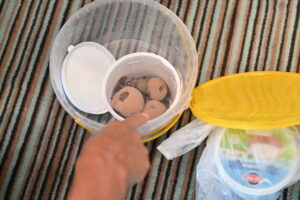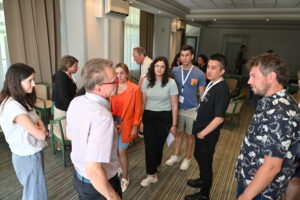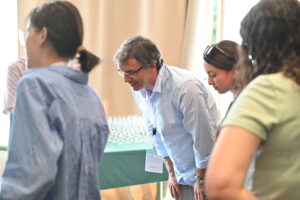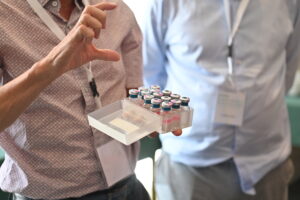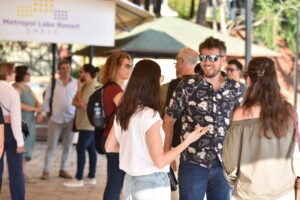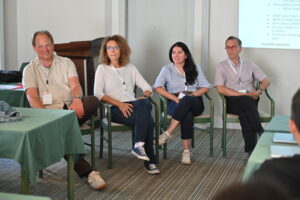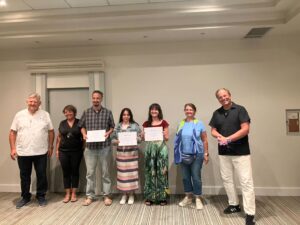What happens when a cohort of Europe’s brightest postdocs come together for eight days of science, collaboration, and exploration? This September, the FEMS Summer School for Postdocs brought this question to life in Ohrid, North Macedonia. Attendees immersed themselves in an intensive programme exploring the vast impact of microbiology on human and environmental health while learning from leading experts and connecting across borders.
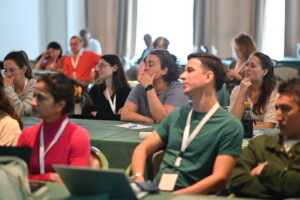 A unique opportunity for Postdocs
A unique opportunity for Postdocs
The FEMS Summer School for Postdocs gives early-career researchers a rare chance to step beyond the lab and engage deeply with cutting-edge microbiology. It offers attendees the opportunity to learn directly from leading academics, collaborate with fellow researchers from across the globe, and build networks that can shape a researcher’s career.
As Cas Cornet (Ireland) reflected: “This was the ideal opportunity to connect both professionally and socially with a diverse cast of early-career postdocs and leading scientists. Never have I learned such a wealth of valuable information over such a short timeframe. The summer school generated a highly motivating and thought-provoking environment that has sparked new ideas and directions for my research.”
Traditionally held in Croatia, this was the first year the FEMS Summer School for Postdocs took place in North Macedonia. With its stunning lake views, rich history, and vibrant culture, Ohrid provided an inspiring backdrop for both learning and exploration.
Inside the 2025 FEMS Summer School for Postdocs
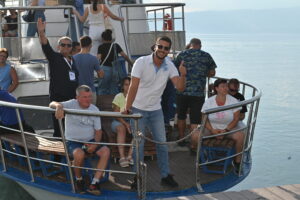
The 2025 edition focused on the theme “Harnessing microbial solutions in environmental research and One Health”. Co-Directors Prof. Joana Falcão Salles (University of Groningen, The Netherlands) and Prof. Tillmann Lueders (University of Bayreuth, Germany) designed a programme to help the next generation of scientists address the environmental dimensions of human health and wellbeing, promoting sustainable practices that benefit both ecosystems and society.
Over the course of the week, the group of postdocs engaged in:
- Lectures and workshops with leading experts, gaining new insights and practical skills.
- Research presentations, where they shared their work, received feedback, and sparked collaborations.
- Mentoring and networking, creating valuable opportunities to connect with senior scientists and peers alike.
Attendees also took part in cultural excursions, experiencing the unique heritage and landscapes of Ohrid, a UNESCO World Heritage site. These activities provided balance, inspiration, and moments to connect beyond the scientific programme, reflecting the dynamic mix of science, culture, and camaraderie that defines the FEMS Summer School for Postdocs.
Project proposals: Putting microbiology into action
As part of the 2025 programme, postdocs were assigned to develop a project proposal exploring microbial solutions in environmental research and One Health. Participants selected their first and second preferences and were divided into four groups, each supported by experienced mentors.
One standout team, Ameni Ben Zineb, Ibrar Muhammad, Sara Fumagalli, and Annie West, worked with mentors Rodrigo Costa and Gabriele Berg to develop an innovative project titled “From Farm to Fork: Microbial-assisted solutions for chickpea production and human health.” Their proposal, which won the Best project award, demonstrated how microbes can enhance micronutrient bioavailability, ultimately contributing to a healthier planet and its inhabitants. The project exemplifies the collaborative spirit and cutting-edge research fostered at the Summer School, highlighting how participants apply scientific knowledge to real-world challenges.
Building careers and a lasting impact
For many, the Summer School’s influence extends far beyond the eight days together. The 2025 edition not only advanced microbiological research but also strengthened the sense of community that defines FEMS. Attendees left Ohrid with new knowledge, stronger networks, and fresh inspiration for their scientific journeys, showing the power of combining high-level scientific training with international collaboration and cultural exchange.
Co-director Prof. Joana Falcão Salles noted, “It was interesting to see two worlds coming together, environmental microbiology and microbial ecology, and I hope that this coalescence will happen more in the future. (…) I really appreciate the openness of everyone; people were willing to share and work together. These networks that you have been building, you take home for the rest of your life, be it academic or personal.”
Learn more about previous editions of FEMS Summer School for Postdocs and the experiences that have shaped early-career scientists across Europe.
